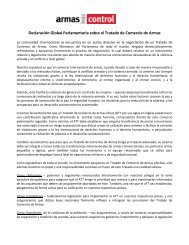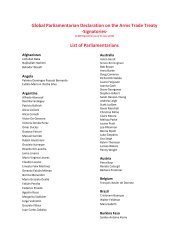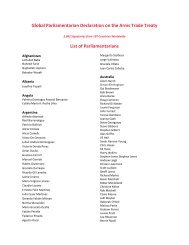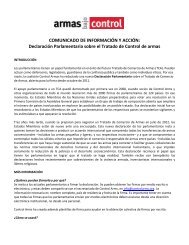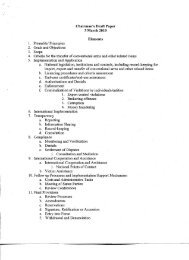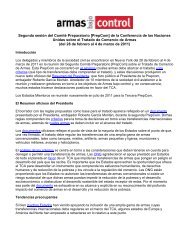SAFERWORLD 17■ Regular meetings of states parties and review conferences;■ A permanent or semi-permanent ‘executive type’ inst<strong>it</strong>ution; and■ A role for civil society.4.2.1Meetings/conferencesof states parties andreview conferencesOne of the most fundamental requirements under any international regime is forstates parties to have the opportun<strong>it</strong>y to meet regularly to discuss issues relating to theimplementation of a treaty. However, beyond the creation of a ‘talking shop’, regularmeetings or conferences of states parties often play a crucial role in overseeing compliancew<strong>it</strong>h Treaty obligations. For example, under the Mine Ban Convention a Meetingof States Parties is held every year for the purpose of considering any matter regardingthe application or implementation of the Convention. Similarly, under the CWC anannual Conference of States Parties is the principal organ for overseeing implementationof the agreement. The CFE Treaty embodies a slightly different approach in thatmeetings of states parties take place twice yearly under the rubric of a Joint ConsultativeGroup (JCG). Established to promote the objectives and implementation of theTreaty, the JCG is empowered, inter alia, to address questions of Treaty compliance, towork out measures that would improve the viabil<strong>it</strong>y and effectiveness of the Treatyregime, to standardise implementation practices, and to help resolve disputes regardingimplementation. However, any matter falling w<strong>it</strong>hin the scope of the Treaty can bebrought to the attention of the JCG. In the environmental sphere, under CITES theConference of States Parties is the supreme decision-making body and meets everytwo-and-a-half years; the Conference of Parties (CoP) to the UNFCCC meetsannually, along w<strong>it</strong>h the Meeting of Parties (MoP) to the Kyoto Protocol.Since states parties are ultimately accountable to each other for their implementationof an agreement, meetings or conferences of states parties often serve as the primarydecision-making and ultimate adjudication body under a treaty. In this regard anumber of agreements contain provisions for states to request the convening of specialor extraordinary sessions w<strong>it</strong>h a view to facil<strong>it</strong>ating and clarifying compliance issues.Thus, while meetings or conferences of states parties do provide an opportun<strong>it</strong>y forstates parties to discuss and take decisions regarding the implementation of a treaty,they also provide a forum where states parties may take decisions regarding allegationsor specific evidence of non-compliance (see section 5.3 below).Under some international regimes, including the CWC, meetings of states parties canalso be mandated, periodically, to undertake a formal review of an agreement. Otherregimes, however, make provision for a special review conference to be held separatefrom periodic meetings or conferences of states parties. For example, under the MineBan Convention the UN Secretary General is tasked w<strong>it</strong>h convening a ReviewConference at intervals of not less than five years. The CFE Treaty also provides for afive-yearly Review Conference, while a Treaty Amendment Conference can also beheld if requested by three or more states parties.In terms of an ATT, provision for an Annual Conference or Meeting of States Partieswould seem a minimum requirement in order to consider technical and proceduralchanges in operating practice; for example, in relation to the provision of informationon international arms transfers or on the operation of verification mechanisms (as isthe case under the CWC and Mine Ban Convention). Such a Meeting could also serveas the forum w<strong>it</strong>hin which decisions are taken concerning allegations or specificevidence of non-compliance. In add<strong>it</strong>ion, there should be provision for periodicreview of an ATT through a five-yearly Review Conference. These could both reviewimplementation and consider possible substantive amendments to the Treaty; in thisregard, the need for some form of follow-up or review mechanism was supported by anumber of states in their submissions to the UN Secretary General. 2525 The Global <strong>Arms</strong> Trade Treaty: What States Want, p 37 and Analysis of States’ Views on an <strong>Arms</strong> Trade Treaty, pp 12–13.
18 MAKING IT WORK: MONITORING AND VERIFYING IMPLEMENTATION OF AN ARMS TRADE TREATY4.2.2 Establishing an‘executive-type’inst<strong>it</strong>utionMeetings and conferences of states parties perform a v<strong>it</strong>al oversight function w<strong>it</strong>hregard to the operation of any treaty regime, in so far as they are responsible for ensuringthat the arrangements and mechanisms established under the treaty are meetingthe purposes for which they were designed. However, the often large membership ofsuch meetings or conferences of states parties and the infrequency of meetings held(commonly one per year) mean that such inst<strong>it</strong>utions are not necessarily best placed tosupport the day-to-day operation of the regime or to perform an ‘executive’ functionand act promptly in response to particular issues of concern. Instead, these requirementstypically necess<strong>it</strong>ate the establishment of a body that e<strong>it</strong>her meets frequently oris permanent. As well as overseeing the day-to-day functioning of the regime, includingthe work of the Secretariat, this body should be capable of taking and acting ondecisions regarding the ongoing requirements of a regime, including the operation ofthe mon<strong>it</strong>oring and verification mechanisms (see section 5).An examination of a variety of existing international regimes demonstrates that mosthave some form of executive inst<strong>it</strong>utional capac<strong>it</strong>y charged w<strong>it</strong>h overseeing the day-todayimplementation of the agreement. For example, under the CWC, the ExecutiveCouncil is the primary subsidiary body made up of 41 states on a rotating basis.Importantly, the Executive Council approves arrangements relating to the implementationof verification activ<strong>it</strong>ies and is responsible for taking up issues of noncompliancew<strong>it</strong>h the states parties involved, possibly bringing matters to the attentionof the Conference of States Parties. The Technical Secretariat, which provides technicalassistance to states parties in the implementation of the Convention and carries outverification provisions under the Convention, is subsidiary to the Executive Council.Between the annual Meeting of States Parties under the Mine Ban Convention thereare also intersessional meetings of four Standing Comm<strong>it</strong>tees addressing various areasof the Convention: General Status and Operation of the Convention; StockpileDestruction; Mine Clearance, Mine Risk Education and Mine Action Technologies;and Victim Assistance and Socio-Economic Reintegration. These Comm<strong>it</strong>tees havetrad<strong>it</strong>ionally held two one-week meetings each year. Further to this, at the secondMeeting of States Parties in 2000 the decision was taken to establish a Co-ordinatingComm<strong>it</strong>tee in order to manage the required high degree of co-ordination between thevarious Standing Comm<strong>it</strong>tees. The Co-ordinating Comm<strong>it</strong>tee meets on an ad hocbasis under the chairmanship of the current President of the Meeting of States Parties.Several inst<strong>it</strong>utions, including the Executive Board of the Clean DevelopmentMechanism and the Joint Implementation Supervisory Comm<strong>it</strong>tee, guide operationalaspects of the Kyoto Protocol. 26 In terms of overseeing the main compliance system ofthe Kyoto Protocol, however, the central inst<strong>it</strong>ution is the Compliance Comm<strong>it</strong>tee,which consists of a Facil<strong>it</strong>ative Branch and an Enforcement Branch. Each branch has10 members elected to <strong>it</strong> by the Meeting of States Parties. Membership of theCompliance Comm<strong>it</strong>tee is supposed to be balanced among the five official UN regionsand between developed and developing country parties. It meets in a plenarycomposed of members of both branches while a Bureau, made up of the Chairpersonand Vice-Chairperson of each branch, supports <strong>it</strong>s work.The CITES executive body is known as the Standing Comm<strong>it</strong>tee. This is made upprimarily of 14 representatives of the parties – elected on a regional basis – whichoversees the operation of the Convention between Conference of States Parties (CoP)meetings. Its functions include: overseeing financial activ<strong>it</strong>ies; co-ordinating andadvising other comm<strong>it</strong>tees, as well as working groups set up by the CoP; draftingpotential CoP resolutions; and performing “any other functions as may be entrustedto <strong>it</strong>” 27 by the CoP.26 These are known as “flexible mechanisms”: Under the CDM, Annex I Parties (industrialised countries and countries w<strong>it</strong>heconomies in trans<strong>it</strong>ion) can implement emission reduction projects (or afforestation or reforestation projects) in developingcountries. Under JI, Annex I Parties can carry out emissions reduction projects or projects that increase removals, in otherAnnex I countries.27 CITES Resolution, Establishment of the Standing Comm<strong>it</strong>tee of the Conference of the Parties, Conf. 11.1 Annex 1, April2000. www.c<strong>it</strong>es.org



